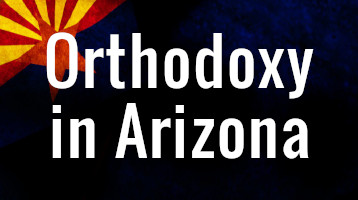
There are things that need to be done—and more than likely you will not have to do them alone. Enlist a support system to lean on. It’s so helpful to have someone to assist with planning a funeral and putting someone’s things in order. It also feels good to have a listening ear and a shoulder to cry on.
The Church continues the ancient traditions of memorial, funeral, and burial of its members. According to the Apostolic Constitutions, memorial services may be held on the 3rd, 9th, and 40th day, and on the anniversary of the soul’s repose. They are also commonly held on the third year anniversary. Some faithful will request a memorial every year on the anniversary of death.
For your part, if you’re unclear about how to handle a death in the family, the list below details what you should do immediately and in the days and months following a death. Remember, you probably don’t have to do this alone. Friends and family will most likely want to help, even though it may be unfamiliar territory for them, too. Delegating responsibilities to family members and others you trust not only eases your burden but also allows them to show you how much they care about you—and it may even help them begin to heal their own feelings of loss as well.
Consider printing and/or emailing this checklist to yourself and close relatives so that you will have easy access to it in the days and weeks to come.
What to do before meeting with a funeral planner
- Speak to your priest. He will make sure that everything will be done to honor your loved one and celebrate the fullness of the Orthodox Christian services, and provide you with pastoral care and help during this difficult time.
- Designate a main point of contact, or executor. This might be you or someone else, but whoever it is should also have a friend or family member who can be nearby and help with important decisions and more.
- Gather any documents specifying pre-planned or pre-paid funeral arrangements, and obtain the personal information you need for an obituary and death certificate.
- Contact any religious or military affiliations of your loved one to determine whether burial benefits or specific funeral plans and services are available. If your loved one was a veteran, visit the U.S. Department of Veterans Affairs website at benefits.va.gov/benefits or call 800-827-1000 to explore options for veterans. Your Memorial provider can also inform you of these benefits or help you get the right information.
- Start an obituary. Your funeral director can help you write an obituary, or you may choose to write it yourself. Have at least one person proofread the obituary before it is submitted for publication.
What to do immediately when someone dies
- Notify your priest immediately he can begin the prayers appointed at the departure of the soul from the body, and to plan for memorial (panikhida) services at the Church.
- Notify the authorities that a death has occurred. If you’re not in a hospital or with hospice care at the time of the death, call 911 immediately so that the death can be legally pronounced. If your loved one is in a hospital or under hospice care, this task generally falls to the medical caretakers.
- Arrange for transportation of your loved one by calling the Memorial provider nearest you. Often, they will arrange transportation with no obligation to use their funeral services (be sure to verify this). Be aware of any arrangements that need to be made for autopsy or organ donation before a mortuary or crematorium takes your loved one into its care.
- Notify family and close friends of the death. You may wish to ask some of these people to inform others.
- Contact local monasteries, and request prayers for the newly departed. They have services daily, and will, at your request, pray for the repose of your loved one for 40 days, according to the Orthodox tradition. They also can celebrate panikhida’s for the departed.
- Arrange for a caretaker for children, elderly parents and pets. This is a good task to delegate to someone you trust.
- If he or she was still working, notify your loved one’s employer. Ask about remaining pay, life insurance, benefits or any other work-related details you may need to know.
- Locate the will and any pre-planned funeral arrangements.
- Select a funeral home, mortuary or funeral director to begin the process of planning a funeral, memorial service, cremation or celebration of life, if this has not been pre-planned already.
What to do after the Funeral
Get multiple copies of the death certificate. You will need them! The executor and funeral home director will need to contact the following agencies, most of which will request at least one copy of the death certificate:
- Social Security (800-772-1213; socialsecurity.gov) to discuss ceasing benefits, obtaining survivor benefits and Medicare. Veterans Affairs may also be necessary for the cessation of benefits (800-827-1000; va.gov).
- Health, life, homeowner, automobile and other insurance companies to cease or transfer benefits.
- Utility companies to change or stop services.
- Employer for pension plans or employment benefits; each separate claim will require a separate copy of the death certificate.
- Probate attorney for asset, trust and estate inventory.
- Tax preparer to determine if an estate tax return or final income tax returns should be filed.
- State department of motor vehicle services to cancel driver’s license.
- Bank for safe deposits and remaining accounts; you may be advised to open a new account for the estate.
- If there is a will, deliver it to the appropriate office for probate.
- Notify the post office of the death and the location to which mail should be forwarded. (Going through your loved one’s mail can help you become aware of bills, subscriptions or other accounts or services that should be canceled.)
- Notify the police if your loved one left behind a house that will sit vacant, so that they can periodically monitor the home against suspicious activity.
Afterwards
It is traditional to hold a memorial/panikhida service on the 3rd, 9th, and 40th day after the repose of an Orthodox Christian. These are beautiful services, and excellent opportunities to come together to pray for the repose of the departed, and to support each other in love. For surviving spouses, there is also a 6 month memorial. After that, the departed one is remembered annually with a memorial/panikhida on the anniversary of their repose.
Grief is natural, personal and has no timetable. It may last for a shorter or longer time than you expect, and it may be coupled with feelings of anger, guilt, emptiness or hopelessness. Whatever your experience, know that you are not alone, and that there are family and friends all around you who are willing to support you at this time.
Notes
A Panikhida (Greek for ‘all nighter’) is a prayer service offered by a priest for the repose of the soul of an Orthodox Christian who has departed this life. Customarily a Panikhida is served on the third, ninth, and fortieth day after the repose of the Orthodox Christian, and every year on the anniversary of the repose. The Panikhida is also known as the parastas, pannychis, or in abbreviated form as the “Trisagion for the Dead.” Only departed Orthodox Christians are commemorated at a Panikhida.


